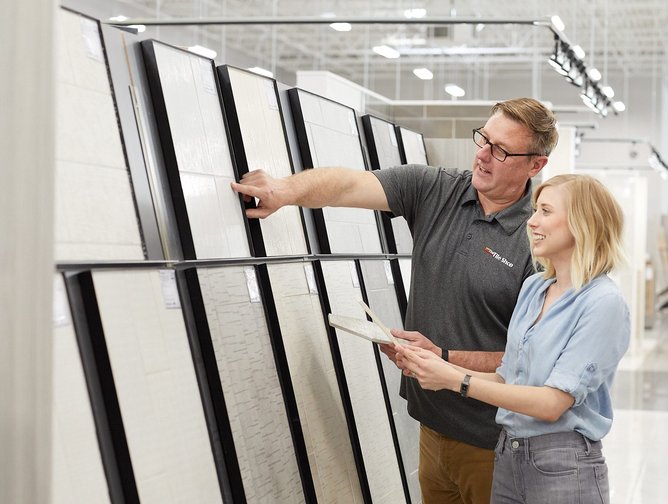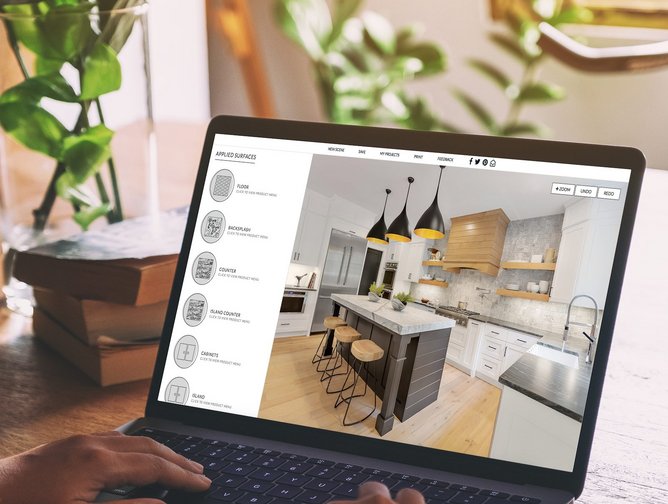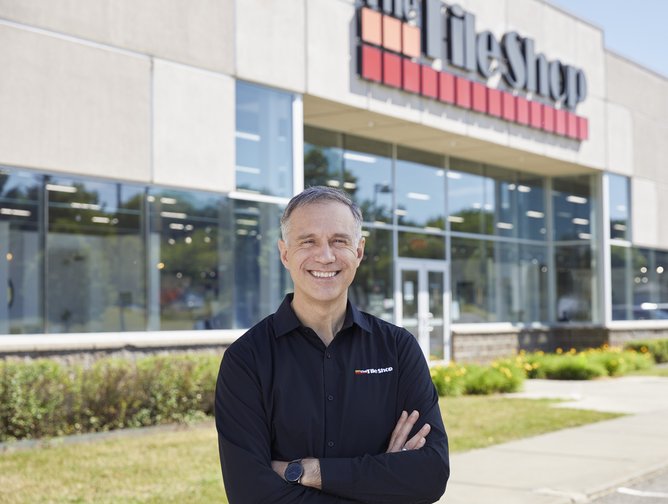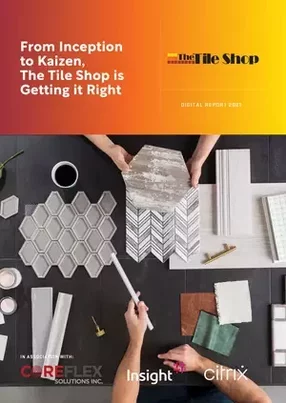From Inception to Kaizen, The Tile Shop is Getting it Right
With the warm, purposely paced tone of an expert communicator, Christopher Davis gets his points, his passion, and his purpose across with little ambiguity and a whole lot of heart.
Christopher seems to have found his home at The Tile Shop, where like-mindsets and a rich people-first culture work collectively to get the company exactly where it needs to go.
“I had a CEO who once said, if you don't know where you are today, it doesn't matter where you want to go because you’ll never get there. So one of the first things that I try and do is understand where an organisation is. Then, I look at the people, processes, and technology to find changes critical to driving success”.
“When I walked in the door, The Tile Shop was suffering something similar to battle fatigue. They had gone through an SAP implementation that had been really tough. Unfortunately, The SAP go-live was the first day of the CEO's new job, and he spent six months leading The Tile Shop back to stability”.
Additionally, The Tile Shop had been feeling the swift blows of heavy tariffs. To mitigate risk and save on costs, they focused their efforts on diversifying their supplier base. By the time Christopher walked through the door, they had learned how to operate in a more resilient “COVID” tested model and were ready for further change.
“They were ready to use technology to grow and be successful, but they lacked the know-how. They needed a leader that could come in and know where to start. When I started, I had a very small team who, although very capable, didn't have the breadth of knowledge and experience needed to accomplish what the organisation wanted”.
“So, in our case, the most critical thing to change first and foremost was the people. We were understaffed and lacked the specialized skills required. When that's wrong, you can't deliver the goods”.
Inception: Setting the Foundation
“When we travelled on business, he'd occasionally give $5 as a tip at McDonald's for the person at the counter. He's the kind of person who understands the value of people intrinsically.” Davis is describing Jeff Wagaman, a once boss and still friend, who taught him the value of people, something Davis never forgot”.
“One of the first things we did at The Tile Shop was double the size of our team. We've increased the depth of our experience significantly in SAP and other infrastructure and capabilities. The reality is that it has taken a huge amount of time to get the right talent with the right experience and cultural fit for The Tile Shop. Our culture is very good, very people-centric. Now we’ve found the right talent, and I'm excited about that”.
“Currently, we're working on the foundation.” Much like in a home, installing beautiful tile on an unstable foundation is a bad practice that essentially sends good money after bad. Layering technology over poor business processes is simply poor business. “Right now, my job is to make sure that we do the foundational things first. Get those right, and then we'll start looking at that tile,” said Davis.
Change Management, a People-First Approach
Davis says, “Change management has many aspects. It is everything from helping people understand the culture to ensuring that we provide the right training and communication. I try and remember Peter Drucker's statement that culture eats strategy for lunch. And right now, we’re building that culture again. We’re setting the right expectations, passion and commitment to solve problems and deliver quality”.
“Without buy-in, you are never going to get it right. I always tell people it's people, process, and technology, in that order. When people understand why you want to do something, there is such a difference in their willingness and interest in doing it. And when they can trust you because you've demonstrated over time that you're going to do right by them, then they're willing to take that risk when they see something scary. And change is always scary. It doesn't matter how easy or how hard it is. It's scary because it's different, and different makes people question ‘Am I going to get it right’”?
“From my perspective, it's about listening to people, understanding their challenges and their opportunities, but it's also about the relationship at a personal level. You need to know each person, and each person is different. The beauty of individualism is that you get to know each person and understand how they work. And when you understand how they work and meet them at their level, you're going to be successful not because the technology worked, but because you understand and solve their problem”.
“It's about making sure that you communicate constantly, that people understand the expectation, the ‘why’ behind it. You also need to make sure that when you fall down, you say, ‘okay, we made a mistake. Now let's learn from it. And let's not do that one again’. Change management is a process. It’s not a moment in time. It’s important to remember, change management takes time. It is not going to happen overnight”.
The Kaizen Philosophy
Kaizen is a Sino-Japanese word, Kai meaning change and Zen meaning good. The philosophy popularized by Toyota is the belief that small, incremental improvements add up over time.
While dealing with the impacts of the global pandemic, The Tile Shop has been able to pay off all debt through gained efficiencies and reduction of inventory, proving that the kaizen mindset seems to be doing them right.
“My thought process is you can't sit still. If you sit still, you're falling behind because your competition is not sitting still. It really comes down to an Agile method and mentality, a mindset of being able to continually make changes and improvement”.
“As I work with partners, I learn new things, and I may change my course of direction. That's the process. And if you can make sure that you bring people along for the ride, then that process is successful. The biggest challenge is not doing anything because you're afraid to start. Fear can be a great deterrent”.
Value Extracting Partnerships
In parallel to laying the foundational elements needed for future growth and development, The Tile shop is “opportunistically leveraging cutting-edge technology solutions”, focusing their attention and resources toward leapfrog opportunities. “For example, we are looking at machine learning capabilities embedded in solutions from email security to web search as well as Google-like search visualization tools for ad-hoc analytics,” says Davis.
“Our core priorities this year are retail execution, improving our website, improving our supply chain experience and improving our analytics”.
To ensure true partnerships that maximize value, Davis looks for transparency and a bent ear. “Partnership, to me, means that the other person listens, understands, and then goes and tries to solve the problem. My true partners take the time to listen, understand my problem, and have sometimes even surprised me with the solution. Those are some of the most wonderful outcomes because it shows that they are really are listening”.
“I’m a big believer that transparency gets you a lot further in relationships. I've never believed that playing games gets you where you need to be. Clear, transparent communication makes the difference. And that's what I expect from my partners”.
Davis shares with us some of his most valued partnerships. “Microsoft has been a good partner as we've rolled out a collaboration platform in Office 365. And we used Insight, a company that provides equipment and software, for our implementation of Office 365. They were excellent. The rollout has been very, very smooth, and very successful. They focused on change management and communication to make that happen”.
“We have also started replacing our store network to increase the stability of our stores using CISSDM, a great company that I trust and have used multiple times. They know how to do networks. They have the right engineering. In fact, we've had to leverage their expertise more than we initially planned. They've been an excellent partner to deliver our store network”.
“These are basic elements, but for The Tile Shop, they’re critical, foundational items. Leveraging leading-edge cloud technologies and using premier partners drives us to our endgame faster”.
“Pro Market Managers, our business development team, use a CRM Salesforce platform. Coreflex Solutions is supporting and enhancing the platform, and they’ve been very helpful. They've been able to make improvements, but they also happen to be a great SAP offshore partner for us. So they’re helping us with testing for our SAP upgrade. I've had the pleasure of working with Coreflex multiple times at several different companies. Their leadership knows what they do well and will do it, but they will also tell you what they don't do. When I go to them, I always know what I'm going to get”.
“Citrix is the underpinning of our stores and warehouses today. The company has been with us a long time, but they've re-engaged with me, and we're talking about new solutions. I'm describing what we want to do, and they’ve suggested we might actually need to reduce our licensing to deliver the solutions that we ultimately want and need”.
“At the same time, they also want to talk about security capabilities—foundational services that keep our organisation safe. And just like the other partners I've mentioned, Citrix is another one who has been willing to listen”.
Before we wave our goodbyes, I ask Davis about the fate of retail and the role of eCommerce.
“Retail is not dead. Retail is no different than it's always been. It's constantly moving and changing. You just have to bounce back, whether it's an unexpected result, the challenges of transportation and supply chain or your customer suddenly deciding they no longer want to do business the same way. You can't stay put in retail”.
“Everyone talks about Omnichannel. I think of it as channel-less. Customers want what they want--when they want it, how they want it, and where they want it. Don't think in terms of channels; just be where your customer is and provide a frictionless experience.”




